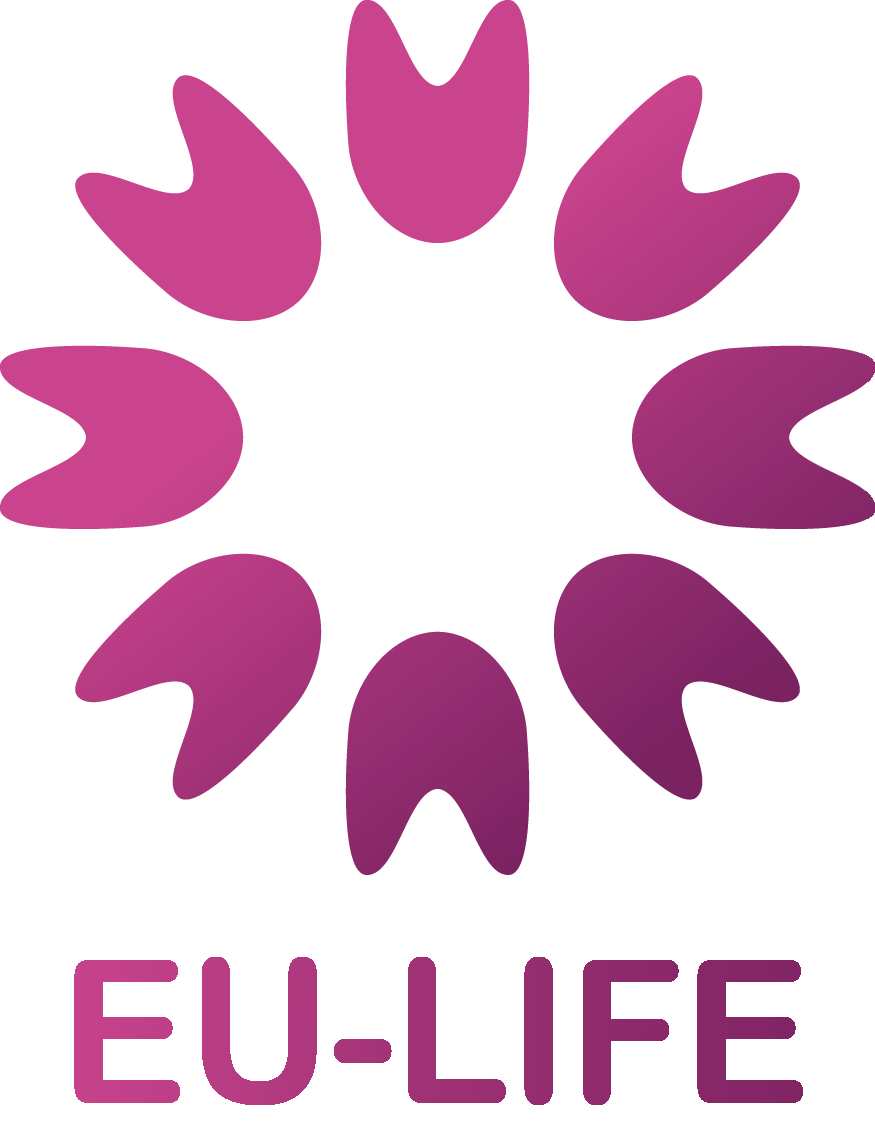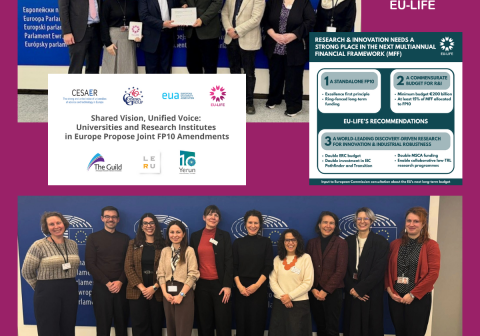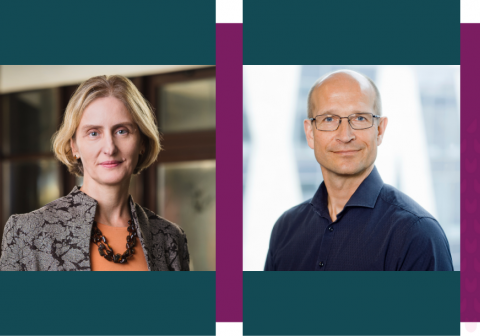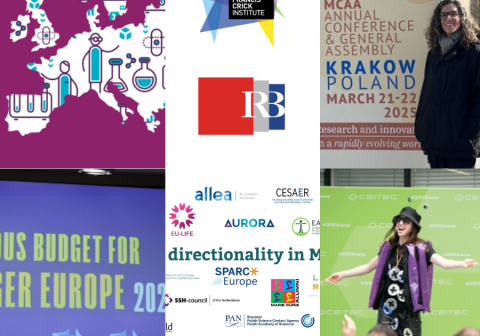Standing in solidarity with Ukraine
In light of the recent military attack by the Russian Government against Ukraine, EU-LIFE expresses its strongest support for the scientific community in Ukraine and for all the individuals suffering the horrors of war.
In addition to issuing statements and joining external initiatives to mitigate the consequences of this deadly conflict, EU-LIFE institutes are taking action to support Ukrainian researchers. These measures include contributing to international humanitarian aid and hosting researchers displaced by war.
“We stand together in solidarity with the Ukrainian people and the Russian citizens protesting against this war, and are willing to support them as much as we can. Ukraine is a valued research partner in Europe and this situation seriously threatens the whole scientific community,” said Marta Agostinho, EU-LIFE Executive Director.
Different platforms are centralising specific offers from the international scientific community to Ukrainian students and researchers, such as #ScienceForUkraine, ERA4Ukraine, ERC for Ukraine and EMBO Solidarity with Ukraine. We will gather and update our institutes’ resources and offers for scientists at risk in this page.
Open positions for Ukrainian researchers in EU-LIFE institutes
CEITEC, Central European Institute of Technology (Brno, Czech Republic)
A postdoc position is open in the Dr Dalibor Blažek lab. His research team is dedicated to understanding the roles of CDK12, CDK11, and other transcriptional kinases in the regulation of gene expression and their targeting in human diseases, particularly cancer. If you are interested, contact hr@ceitec.muni.cz
A postdoc position is available in the Robert Vácha lab. They are seeking a person with expertise in computer simulations of proteins or membranes and experience with all-atom or Martini models. If you are interested, contact hr@ceitec.muni.cz
A postdoc position is available in newly established Demo lab to participate in research focused on structural mechanisms of transcription-translation coupling in virus-infected mammalian cells. We are seeking a person with expertise in molecular biology, biochemistry and virology, specifically in the field of dsDNA viruses and virus-infected mammalian cells (to produce the viruses) and with some expertise in single-particle electron microscopy and cryo-electron tomography. If you are interested, contact hr@ceitec.muni.cz
CeMM, Research Center for Molecular Medicine of the Austrian Academy of Sciences (Vienna, Austria)
The mission of CeMM is to achieve maximum scientific innovation in molecular medicine to improve healthcare. CeMM’s research is based on post-genomic technologies and focuses on societally important diseases, such as immune disorders and infections, cancer and metabolic disorders. We are offering up to 5 fully funded guest scientist positions (wet-lab and/or computational) for initially 1 year to life scientists and students from Ukraine. If you are interested, contact application@cemm.at
CRG, Centre for Genomic Regulation (Barcelona, Spain)
Baud Lab is offering various types of positions (trainees, technicians; from a few months, up to 2 years), all paid, in the broad domain of computational genetics and/or analysis of laboratory animal behaviour on videos. If you are interested, contact amelie.baud@crg.eu
Gebauer Lab is interested in roles and mechanisms of RNA-binding proteins (RBPs) in cancer, in particular on translational reprogramming. Their work involves high-throughput identification of RBP mRNA targets, proteome-wide identification of protein partners, analysis of RNA-binding specificities, in vitro assays to understand mechanisms of translational control, and in cellulo and in vivo (mice) assays to test our predictions. They have space for 1-2 Ukrainian visiting scientists (wet or dry) at the PhD-postdoc levels. The scientists should be supported by external funds. If you are interested, contact fatima.gebauer@crg.eu
Novoa Lab studies the role that RNA modifications (the ‘epitranscriptome’) play in diverse biological contexts, including neuronal differentiation, stress responses and intergenerational inheritance. To this end, they use a combination of wet lab (molecular biology) and dry lab (computational biology) techniques in diverse species and models (human cell lines, yeast, bacteria, mice). Specifically, they employ and develop novel protocols and algorithms that rely on the use of RNA nanopore sequencing technologies (direct RNA-seq), which is a novel platform that allows us to directly sequence native RNA molecules, including their modifications, in a high throughput transcriptome-wide manner. They are happy to host a Ukranian MSc, PhD or postdoc for an internship. If you are interested, contact eva.novoa@crg.eu
Weghorn Lab is looking for a postdoctoral researcher to join the “Evolutionary Processes Modeling” group. They use computational analysis of sequencing data together with population genetics predictions and statistical modelling to answer questions about mutational processes and selective pressures in cancer cells and in the human population. The ideal candidate should be highly motivated and eager to work on evolutionary and biological problems through the use and development of computational and statistical approaches. If you are interested, contact dweghorn@crg.eu
Institute Curie (Paris, France)
The Membranes and cellular functions team, led by Patricia Bassereau, would be able to host Ukrainian researchers. Description of their work: Lipid membranes exhibit non-trivial properties especially at length scales larger than protein molecular sizes. A purely molecular description of membranes is insufficient to arrive at a quantitative understanding of their functions and require meso-scale concepts coming from soft matter and statistical physics. If you are interested, contact aide.ukraine@curie.fr
The Structural motility team, led by Anne Houdusse-Juille, would be able to host Ukrainian researchers. Description of their work: In the human body, the coordinated movements and trafficking of cellular components are essential to the cell function, division and survival. Within the cell, the movements of large macromolecules, vesicles and organelles cannot rely upon simple diffusion, but instead biological motor proteins have evolved to enable directed and rapid movements and trafficking. If you are interested, contact aide.ukraine@curie.fr
The Quantitative Immuno-hematology team, led by Leïla Perié, would be able to host Ukrainian researchers. Description of their work: Our research interest lies in understanding quantitatively how hematopoiesis functions during homeostasis, ageing and infection. To untangle this question, we combine experimental and computational approaches at the single cell level both in mouse and human. If you are interested, contact aide.ukraine@curie.fr
The Physical approach of biological problems team, led by Pierre Sens, would be able to host Ukrainian researchers. Description of their work: Cell biology and soft matter physics both share similar orders of magnitude with two important differences: biological systems are clearly out of equilibrium and molecular specificity can be strongly relevant. We are using the standard tools of soft matter physics to provide a quantitative description of cellular systems. Drawing inspiration from living systems, we are raising new and challenging physical questions. This project only makes sense with strong interactions with biologists. If you are interested, contact aide.ukraine@curie.fr
Deborah Bourc'his team works on germline and early embryonic development in the mouse, studying aspects of epigenetic regulation related to retrotransposon control, parental inherited effects, and fertility. They can accomodate a Ukrainian scientist of any level, for offices and laboratories. If you are interested, contact deborah.bourchis@curie.fr
Coulon lab studies the spatial organization and dynamics of the mammalian genome and the regulation of its expression using a combination of imaging and modeling approaches. They can host a Ukrainian scientist at any career level. If you are interested, contact antoine.coulon@curie.fr
The Physical Chemistry Curie laboratory works on physical approaches to living systems, from the molecular scale to the tissue and embryo, with experimental and theoretical approaches. They would be happy to receive and support Ukranian scientists of any level (funding unsure). If you are interested, contact pascal.hersen@curie.fr
The Carsten Janke's lab explores the regulation of the microtubule cytoskeleton, focusing on molecular mechanisms referred to as the 'tubulin code', which are expected to regulate the behaviour of microtubules in cells, thereby adapting them to different functions. Their expertise reaches from single-molecule experiments over cell biology to whole-organism studies. They can host 1-2 researchers or students. They are also recruiting a research technician and would be happy to consider applications from Ukraine. In addition, they can provide temporary housing for a couple of months for 1-2 persons who can share one room. If you are interested, contact carsten.janke@curie.u-psud.fr
FiMM, Institute for Molecular Medicine Finland (Helsinki, Finland)
FiMM would be happy to hosts several students and researchers and provide accommodation & research space/support. Specifically, the FinnGen project would welcome computational human genetics researchers to their teams and they are happy also to find contacts in other biomedical research labs locally. If you are interested, contact fimm-director@helsinki.fi
IGC, Instituto Gulbenkian de Ciência (Lisbon, Portugal)
IGC is actively identifying different ways to support science researches (in all career levels) forced to leave Ukraine and providing laboratories to welcome them in Oeiras. A list of opportunities in labs and other areas is available here
IIMCB, International Institute of Molecular and Cell Biology in Warsaw (Poland)
IIMCB offers tailored positions at different career stages in research areas presented at IIMCB. If you are interested, contact support-Ukraine@iimcb.gov.pl
IMBB-FORTH, Institute of Molecular Biology and Biotechnology (Heraklion, Greece)
Talianidis Laboratory would be happy to host scientists at any level. The lab studies epigenetic mechanisms involved in the regulation of gene expression in physiological and pathological conditions. If you are interested, contact talianid@imbb.forth.gr
Evgenia Ntini Lab, a junior group studying RNA mediated mechanisms of gene regulation, would be happy to host scientists at any level, bioinformaticians and computational biologists. They can also help with accommodation of researchers finding institutional host opportunities in Athens. If you are interested, contact evgenia.ntini@imbb.forth.gr
Moschou Lab works on developmental cell biology in plants, focusing on models, e.g. Arabidopsis and crops. They would be happy to host Ukrainian scientists at any level, bioinformaticians and computational biologists. They can offer lab/office space and potentially funding. Furthermore, they can help with accommodation. If you are interested, contact panagiotis.moschou@imbb.forth.gr
Christos Delidakis’ drosophila developmental biology lab focuses on transcription and chromatin control of stem cell behaviour in different contexts. They would be happy to provide space and limited resources to host a Ukrainian scientist (but cannot cover living expenses). If you are interested, contact delidaki@imbb.forth.gr
MDC, Max Delbrück Center for Molecular Medicine in the Helmholtz Association (Berlin, Germany)
MDC offers to jointly apply and host scientists in our biomedical research center in Berlin. Our mission is to understand the molecular basis of health and disease and translating findings as quickly as possible into clinical applications. Better prevention, diagnosis and treatment of diseases are the ultimate goals. Funding possibilities include Phillip Schwartz Initiative, Volkswagen Foundation, DAAD, DFG Researchers at Risk Program or Einstein Foundation. We provide assistance in the application process and professional onboarding with our Welcome and Family Office. If you are interested, contact ukraine@mdc-berlin.de
NKI, Netherlands Cancer Institute (Amsterdam, The Netherlands)
Prof Rene Bernards lab would be happy to fund a 12-month fellowship for displaced PhD student or postdoc who is currently active in cancer research in Ukraine. If you are interested, contact r.barnards@nki.nl
VIB-UGent Center for Medical Biotechnology (Ghent, Belgium)
VIB offers three temporary academic shelter positions (6-12 months) as academic visitor with housing assistance. Molecular life scientists, computational biologists, bio-organic chemists, and researchers with similar expertise are welcome to apply. They will customize support to individual or family situations. If you are interested, contact communications@vib.be



